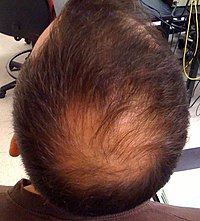
Photo from wikipedia
Background Hairline is the marginal line of hair growth on the scalp. Patients with sideburn defects, caused by tumor resection, severe infection, or burns, might have low self-esteem and mental… Click to show full abstract
Background Hairline is the marginal line of hair growth on the scalp. Patients with sideburn defects, caused by tumor resection, severe infection, or burns, might have low self-esteem and mental stress. The purpose of this article was to explore a surgical method of applying the expanded scalp flap with natural hairline for cosmetic reconstruction of hairline, so as to provide reference for future clinical work. Methods In this study, a retrospective analysis was conducted on 23 patients in the plastic surgery ward of the Plastic Surgery Hospital of the Chinese Academy of Medical Sciences from January 2015 to December 2018, who underwent expanded scalp flap cosmetic reconstruction of the sideburns with natural hairline (14 males and 9 females; average age, 18.7 ± 13.7 years). The follow-up time was 8 to 44 months. Results Patient satisfaction rate (scored 4 or more) was 95.7%, with an average score of 4.59. A total of 16 patients were very satisfied, and 6 were satisfied. There were 21 patients who had good flap survival, and 2 patients who had venous congestion at the distal end of the flap. One case relieved voluntarily 3 days postsurgery, and the other case had partial skin necrosis at the distal end, healing phase II. These 2 cases were classified as grade I according to the Clavien-Dindo classification. In 9 of the patients, the reconstructed sideburn presented a natural look with good hair angle and great size and shape, with average scores of 4.61, 4.52, and 4.48. The scars at the donor site were inconspicuous, and there were no complaints (average score, 4.61). The rest of the patients received satisfactory appearances after surgery. Conclusion In conclusion, the technique described above presented a fine method for sideburn reconstruction. Based on the achieved aesthetic scores of our study, as well as the high patient satisfaction rate (95.7%), the aforementioned technique is acceptable for both surgeons and patients.
Journal Title: Annals of Plastic Surgery
Year Published: 2023
Link to full text (if available)
Share on Social Media: Sign Up to like & get
recommendations!